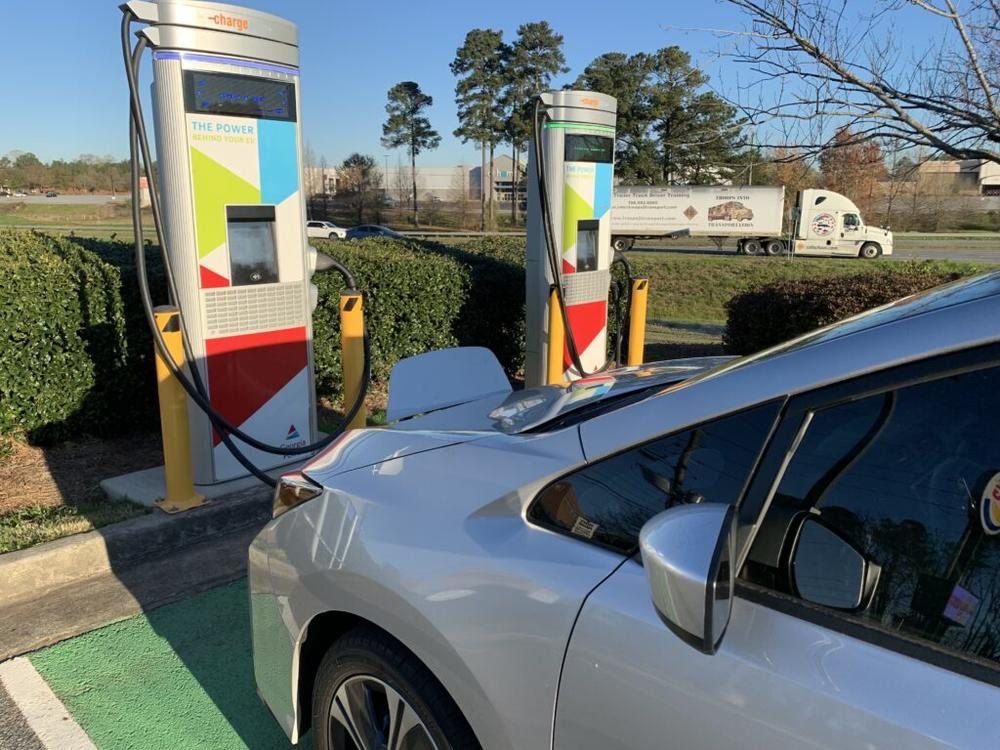
Caption
An electric vehicle charges up at a Georgia Power station located in the parking lot of a Burger King in Columbus.
Credit: Jill Nolin/Georgia Recorder

An electric vehicle charges up at a Georgia Power station located in the parking lot of a Burger King in Columbus.
Georgia’s multiyear plan to spend $135 million in new federal funding to boost electric vehicle charging will focus on the state’s rural and underserved communities, where fast public charging can be hard to come by.
But many details — such as where exactly the chargers will go and what private groups might partner with the state to build them — remain to be settled.
The money is part of the $5 billion in federal funding that was packed into last year’s $1.2 trillion bipartisan infrastructure bill with the purpose of building a national network of a half million electric vehicle charging stations by 2030.
Jannine Miller, who is the state planning director for the Georgia Department of Transportation, told state transportation board members Wednesday that she sees the national program as a way to help instill confidence in people who may be reluctant to make the switch to electric.
“We want to bring comfort and confidence that as they leave their metro areas, they’ll be able to recharge safely and efficiently in rural parts of Georgia,” Miller said.
The state’s proposed deployment plan was submitted this month. The plans show key corridors where adequate charging is in short supply, such as on U.S. 82 between Albany and Brunswick as well as U.S. 441 between Dublin and Cornelia — near the future Rivian electric truck plant.
The national standard calls for installing four 150-kilowatt DC fast chargers that can accommodate all electric vehicles and are located less than 50 miles apart and within one mile of a designated alternative fuel corridor. Currently, about a dozen stations meet the standards along those corridors. Another 30 or more stations need to be built or upgraded.
The state transportation agency plans to roll out these new stations through public-private partnerships, meaning the state would not own, operate or maintain the locations. Private partners will be found through a competitive solicitation process.
“It’s a little bit of a chicken and the egg with EV deployment and adoption continuing to grow and having that infrastructure in place because there’s not necessarily a business case at the moment,” said Transportation Commissioner Russell McMurry.
“This is trying to help — not provide for, but to help — private industry meet that business case such that there’s more charging opportunities, which supports the EV growth that is certainly anticipated and forecasted nationally and here in Georgia.”
McMurry stressed the plan only deals with how federal funding will be spent.
“This by no way has anything to do with limiting or restricting, regulating, or permitting private industry from deploying chargers,” he said.
McMurry’s agency is hashing out the deployment plan as state lawmakers prepare to begin meeting later this month to study the shift to electric vehicles and what the state should be doing to prepare.
At the urging of the state’s convenience stores, a bill dealing with the role utilities should play in the electric-vehicle charging business was on the move in the 2022 legislative session but suddenly stalled. Georgia Power has used ratepayer money to install dozens of public charging stations.
A measure creating a study committee passed instead, teeing the issue back up for next session. McMurry said that committee’s work could influence how the agency’s electric vehicle charging station plan is ultimately implemented.
“We’ve got to move cautiously so that we get this right. It’s very important that we don’t end up with charging stations that are not functional,” McMurry said. “We want to make sure this is right so it’s successful, and we’ve got a lot to learn about how we’ll interface with this.”
Some advocates have said they are encouraged by what they have seen so far, particularly the focus on rural, underserved and disadvantaged communities as required by the Biden administration.
“The draft plan talks a good game on equity, and we urge the state to put it in action and prioritize infrastructure in communities overburdened by vehicle pollution first,” said Mark Woodall, conservation chair of Sierra Club Georgia.
This story comes to GPB through a reporting partnership with Georgia Recorder.